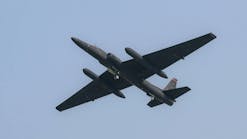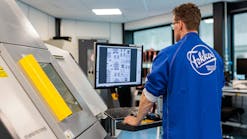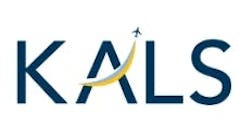Oct. 30—After a fuselage panel blew off a 737 in January, Boeing found itself in a familiar place — on Capitol Hill, under Congress's microscope.
In 2008, Congress had found that nearly 60,000 Southwest flights in 2006 and 2007 were allowed even though the airline knew the Boeing planes were out of compliance with Federal Aviation Administration safety standards. After Southwest came clean to the FAA, the agency allowed over 1,000 more flights on the out-of-compliance aircraft.
The scrutiny Boeing was facing from Congress intensified considerably after fatal crashes of Boeing 737 MAX airplanes in 2018 and 2019, and was reinvigorated again earlier this year when a hole opened in the side of a 737 as it climbed out of Portland.
A common theme ran through Congress' findings in those instances: The FAA was often deferential to the manufacturer whose work it was meant to police.
Then a subplot emerged.
Congressional hearings revealed Boeing had been hiring ex-government workers, people with personal connections to and intimate knowledge of Beltway politics, to pressure the agency whose primary purpose is to assure safe air travel.
Critics of the practice view the Boeing hearings of 2008 and 2020 as clear evidence that a "revolving door" — when ex-government officials move to jobs in industries they had policed, sometimes returning to government after their stints in the private sector — was undermining oversight. They claim the specter of more lucrative employment in industry sometimes drives regulators to conduct weak oversight in hopes that they can cash in on their government experience. Once through the revolving door, ex-government workers may use their connections with their former colleagues to apply pressure on regulators.
Key decision-makers who passed through the revolving door connecting Boeing and the FAA compromised regulatory oversight, according to the chairman of a committee who led those hearings in Congress.
Congress responded by adopting new laws in 2008 and 2020 that prohibit FAA employees from moving directly to the industry they regulate. Now, former FAA employees must wait two years before they can represent companies such as Boeing in interactions with the government.
Boeing and the FAA say the laws have been implemented and are being followed. But critics, including lawmakers who drafted the legislation, say those measures didn't go far enough.
In 2022 alone, the 20 highest-paid defense contractors hired 672 former government officials, military officers, members of Congress and senior legislative staff, according to a report commissioned by Sen. Elizabeth Warren, D- Mass. Boeing hired the most by far, 85. Boeing also hired more former government officials to executive positions than any other Pentagon contractor, the report showed.
At the FAA, it's common for senior political appointees to come from industry, and return to it after their tours in government.
But the FAA today says the revolving door isn't the problem that that critics make it out to be.
Political appointees at the agency pass through the revolving door to industry more frequently than civil service employees there, FAA spokesman Ian Gregor said. The average tenure for a political appointee at the agency is just 2 years and 2 months, while the average tenure of FAA civil servants is over 12 years.
He noted that the FAA strives to abide by the restrictions on post-government employment that require cooling-off periods before representing their new employer in regulatory actions involving their former workplace.
"We do not agree that there is a revolving door between the FAA and industry," Gregor said, noting that FAA follows the laws governing its employees who accept jobs in the aerospace industry.
"The FAA's response would be laughable if it weren't so discordant with the facts," said Dylan Hedtler-Gaudette, director of government affairs at the Project On Government Oversight, or POGO, a nonprofit government ethics watchdog. "For the FAA to claim that it is not a revolving door to industry is to tell us not to believe our lying eyes; truly Orwellian stuff."
'A cozy relationship'
The revelation 17 years ago was astonishing: 46 Boeing aircraft owned by Southwest Airlines had carried passengers on nearly 60,000 flights in 2006 and 2007 while all of the planes' fuselages fell short of federal standards.
Southwest had told the FAA its planes were out of compliance, but the responsible FAA supervisor waited eight days to ground the planes, allowing almost 1,500 more flights on compromised aircraft. Whistleblowers would later pin the delay on a close relationship between the FAA supervisor and Southwest's regulatory compliance manager, a former FAA employee.
It ultimately took three parallel investigations and several years to lift the veil on how airlines and aerospace giants like Boeing rely on ex-government officials on their payrolls, and C-suite meetings with regulators, to sway the government.
"We want to know that the people who are making the decisions that are going to have potentially fatal consequences are there representing the views and the best interests of the public of the United States, not looking over their shoulder or looking ahead to their next gig, which would obviously be more lucrative," former Rep. Peter DeFazio, D- Ore., said in a phone interview. DeFazio led congressional hearings into the crashes of 2018 and 2019 and authored legislation promoting stronger oversight of the aerospace industry.
"The American public can't afford a cozy relationship between the FAA and those it regulates," said Sen. Maria Cantwell, D- Wash.
After the scandal-driven reforms of 2008, the cooling-off period became law. But then, Congress kept its hands off the FAA's revolving door until two Boeing 737 MAX jets crashed in 2018 and 2019, killing 346 people, largely because of a catastrophic engineering lapse. Boeing's sway over FAA officials again took center stage in Congress.
The chief safety officer at FAA headquarters at the time, Ali Bahrami, became the face of the revolving door at the House committee hearings led by DeFazio.
Before joining the executive ranks at FAA, Bahrami was an FAA safety lead at its Seattle office, where inspectors complained that he was too deferential to Boeing. Bahrami next worked for the Aerospace Industries Association, the lobbying juggernaut that represents Boeing and other aerospace companies. In that job, Bahrami pushed for further delegation of FAA oversight to the manufacturers who paid his salary.
That didn't stop the federal government from welcoming Bahrami back. He occupied a post one rung below the FAA administrator in 2017.
At the hearings, it was revealed that Bahrami overlooked an FAA analysis of the first MAX crash, in 2018, that warned more accidents were likely if a vital flight-control system wasn't fixed. Bahrami did not direct the FAA to ground planes with the known defect, and some families who lost loved ones six months later in the second crash blamed him directly.
Following the hearings in 2020, Congress acknowledged the revolving door phenomenon had undermined safety, passing far-reaching legislation that tried to address the revolving door and much more.
Among its provisions was a Bahrami-inspired two-year cooling-off period for some former FAA personnel before they can represent a private employer on government actions, and a one-year wait for new FAA employees before they can deal with their former employers. The law also prohibited some meetings between high-ranking FAA officials and Boeing executives.
The cooling-off periods built into the 2020 law are similar to restrictions passed by Congress in 2008, but longer — two years instead of one. Close observers say both measures amounted to little more than another ineffective employment restriction. Even DeFazio, who authored the 2020 expansion of revolving-door restrictions, questions whether Congress has done enough.
"We're nibbling at the margins," DeFazio said.
A question of political will
Boeing is uniquely positioned to pressure government agencies responsible for overseeing the company's contracts and regulatory compliance. The military aircraft and weapons it produces make it a Pentagon mainstay. Meanwhile, its commercial aircraft division, regulated by the FAA, is a crucial fulcrum for American air-travel and cargo industries.
The personnel who roam between jobs in government and corporate America are the tendons that allow Boeing to flex its muscles.
Boeing has hired away Pentagon officials who worked directly on the company's defense contracts, Congressional staff who were then deployed to steer lawmakers on everything from subsidies to safety expectations, and FAA officials who've traded government work for bigger paychecks with private-sector aerospace firms.
At least seven of the past 10 FAA administrators moved on to jobs with the industry they regulated. None moved directly to Boeing after heading the agency, but one revolved to lead the Aerospace Industries Association, which lobbies on behalf of Boeing and other aerospace firms and employed Bahrami before Congress confirmed him as FAA's top safety official.
Current FAA Administrator Mike Whitaker is a former United Airlines and Delta Air Lines executive. His predecessor, Michael Huerta, joined the Delta board after leaving FAA. Before that, Randy Babbitt left the top FAA job to become an executive at Southwest Airlines.
These travelers through the revolving door alone undermine the FAA's claim that it's not a revolving door to industry, according to Hedtler-Gaudette of the Project On Government Oversight.
"If that FAA administrator goes to a company it has regulatory authority over, you have to question every decision that administrator made," Hedtler-Gaudette argued.
That isn't to say that there aren't benefits to the revolving-door system, or that all who pass through the revolving door are corporate mercenaries. In fact, some who've challenged safety practices on Boeing's factory floor moved on to the FAA, where they championed safety even when it meant taking on their new bosses.
" Boeing employees come from a wide variety of backgrounds with a range of relevant expertise, and the company works to ensure that it abides by all laws and regulations when hiring talented professionals to join our team," Boeing spokesperson Deborah VanNierop said in a written response to questions from The Seattle Times.
An open door for employment between government and industry benefits the FAA, according to spokesman Gregor.
"Highly qualified candidates are more likely to take government positions knowing they have future, and potentially more lucrative, career options in the industry in which they are qualified to work," he said.
Boeing plucks workers from the Department of Justice, which has threatened prosecution of the company, and may do so again. It also hires from the White House, the State Department, the Navy and the Air Force. Their jobs at Boeing include lobbying, managing government contracts and interacting with regulators, according to the report commissioned by Warren.
Efforts to further curb the revolving door between government and industry inevitably face headwinds from the clout-laden companies that benefit from the practice, according to Hedtler-Gaudette.
"It requires more political will," he said. "The only people opposed to these rules are the people who benefit from these rules not existing."
Congress' first bid to prohibit awarding contracts to companies that hire retired Pentagon officials came in 1959. President Dwight Eisenhower encouraged the legislation to stem the growing clout of the burgeoning "military-industrial complex." It failed by one vote.
Congress hasn't taken any new action targeting the revolving door to the aerospace industry since the hearings of 2020 and the legislation that resulted.
In its highly critical audit of the FAA's oversight of Boeing released Oct. 11, the Department of Transportation Inspector General called the FAA's oversight model "a failing system" that the agency could improve, and along the way, restore public trust in the safety of Boeing aircraft.
___
(c)2024 The Seattle Times
Visit The Seattle Times at www.seattletimes.com
Distributed by Tribune Content Agency, LLC.




